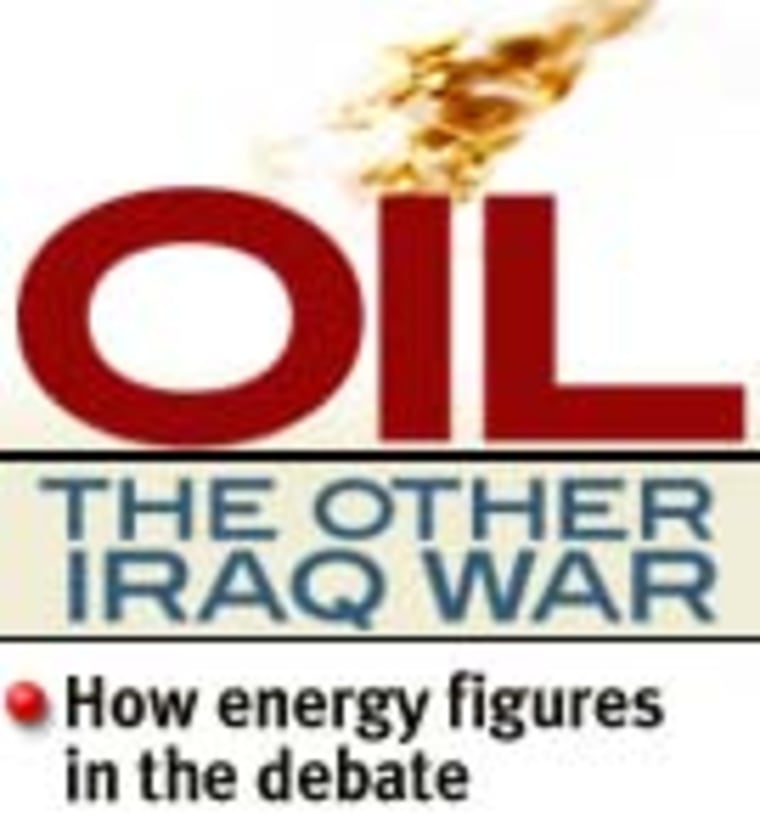As Iraq takes its first tentative steps toward self-government, the country’s creaky oil industry is slowly being restored by the U.S. Army Corps of Engineers, which will soon assign contracts for basic repairs. But the real prize comes later — when the reformed Iraq government begins awarding lucrative contracts to develop vast, untapped reserves that some say could rival Saudi Arabia as the world’s largest pool of oil.

THOUGH OIL HAS slowly begun flowing again through Iraqi pipelines, much work remains before production is back to pre-war levels and exports can begin to generate the cash needed to pay to rebuild the country. For starters, it’s not clear who has legal title to Iraq’s oil. Until that issue is settled, oil exporters want nothing to do with Iraqi oil — even if production is restored to pre-war levels.
“There’s no Iraqi oil authority — no one who could convey title on behalf of Iraq,” said Jim Placke, an analyst at Cambridge Energy Research Associates. ” (Dealers) will want something more than General [Tommy] Franks assurance that this is okay.”
But while Iraq’s legal infrastructure still needs work, the oil industry’s physical infrastructure has to be repaired first. So far, the most immediate tasks have involved putting out a handful of fires, cleaning up looted oil ministry offices and repairing limited war damage.
The bigger task will be restoring a decrepit system of pumping stations, pipelines, refineries and terminals that have been starved for critical parts and maintenance by more than a decade of economic sanctions. The swift awarding of a contract to Halliburton, the U.S. oil services giant formerly led by Vice President Dick Cheney before he took office, raised competitors’ fears that U.S. companies with close ties to the White House would have the inside track on oil contracts. That contract was originally estimated to be worth as much as $7 billion.

But because war damage was limited, Halliburton’s contract will end much sooner than expected, according to Lt. Col. Eugene Pawlik at the U.S. Army Corps of Engineers, which is currently in charge of rebuilding Iraq’s oil industry. After a full assessment of the damage is completed, competitive bids for repair work will be posted on the government’s Fedbizopps Web site, he said.
“The existing Halliburton contract at that point will be null and void,” said Pawlik, estimating that the total value of Halliburton’s deal will amount to about $600 million.
Already U.S. companies are lining up to bid on the rebuilding of Iraq. Last week, Fluor Corp. set up a joint venture with another British construction and engineering firm, Amec Plc, to bid on oil reconstruction contracts. (Another U.S. firm, Bechtel, was recently awarded a contract valued at as much as $680 million to rebuild roads, power plants and other infrastructure, and is inviting companies looking for subcontracts to sign up on its Web site. Reconstruction projects in Iraq outside the oil industry are being handled by the State Department’s U.S. Agency for International Development.)
OIL BONANZA
The task of restoring Iraq’s oil fields will be just the first round what is shaping up to be one of the global oil industry’s biggest bonanzas in modern times. Oil analysts say that even if a new Iraqi government winds up calling the shots over the development of its oil riches, it will need the capital, equipment and technology that only outside oil companies can provide.
The list of countries with a interest in Iraq’s oil industry is long — at least 31 companies from 21 countries have had talks in one form or another with Saddam Hussein about developing Iraq’s oil fields once sanctions were lifted. Russia and France, vocal opponents of U.S. military effort to topple Saddam, top the list. The former regime also cast widely the promise of lucrative oil contracts to smaller countries — from Algeria to Vietnam.
LOTS OF HANDSHAKES, FEW DEALS
But it turns out that, while there were lots of handshakes with Saddam, there were relatively few signed contracts. Among the firmest deals were those made with Chinese oil company CNPC to develop the Al-Ahbad field south of Kut. Russia’s Lukoil thought it had a firm contract to develop the West Qurna field 50 miles northwest of Basra — until Saddam abruptly canceled the deal shortly before the war began, according to Valerie Marcel, an analyst with the Royal Institute of International Affairs who has kept track of Iraq’s oil deals.
“Lukoil played a double game and tried to get assurances from everybody that their contracts would be protected from a change of regimes,” she said. “They extended themselves too much, and they upset the Iraqis by double-dealing.”
Marcel says countries now are vying for a piece of the Iraqi oil development bonanza reached varying stages of agreement with the now-deposed regime. Some got only as far as preliminary discussions. Others at least got something on paper: a memorandum of understanding or an initialed contract. But few have signed contract approved by the Iraqi government.
So with a new Iraqi government months — if not years — from taking full control of its oil industry, it remains to be seen just who will award those development contracts. For the moment, Pawlik says the Army Corps of Engineers’ orders stop short of exploring for new places to drill.
“Our focus is not on the development of new capacity,” he said. “We have been tasked with getting things back to the point of production prior to hostilities.”

U.S. oil companies, who are conspicuously missing from the Saddam’s list of potential development partners, are better positioned to develop Iraqi oil fields than they have been in years. After the oil-price crash in 1998, the major U.S. companies sharply cut capital spending on development projects around the world. Big Oil went shopping for new assets on Wall Street, where it was cheaper to buy up existing fields than it was to punch holes in the ground looking for new ones.
But as oil prices have surged since then, major players like ExxonMobil and Chevron Texaco have rebuilt their war chests and now have cash to invest. Those two companies had combined cash balances of $10.2 billion at the start of this year, up from $3.7 billion three years earlier.

But U.S. oil companies face significant political obstacles — beyond those faced by other oil firms, says Marcel. The fear is that, no matter what new government emerges in the short term, anti-American sentiment could linger long after U.S. military forces have left Baghdad.
“They’re not sure the contract would survive the U.S. leaving,” said Marcel. “So they’re going to wait until there is a stabie, legitimate regime representing the Iraqi people. And that could take 5 years.”
That’s why the initial round of exploration contracts may go to smaller firms located in countries like Russia or China that have developing oil industries — companies who will be more willing to accept the political risks of investing in the early stages of unleashing Iraq’s untapped oil wealth.